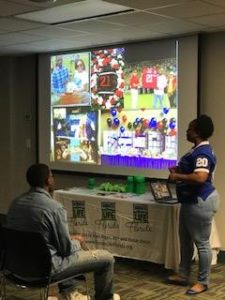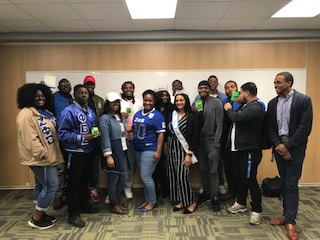Phi Beta Sigma
April 10, 2019: It was a simple yes or no question.
“Are you an organ donor?” I asked at a recent seminar about why African-Americans are reluctant to donate their organs.
A few of FAMU’s Phi Beta Sigma Fraternity brothers proudly raised their hands to show they had joined the registry when renewing their driver licenses or by signing up online. Many shifted their eyes toward the floor or shook their head no.
Then came the familiar fallacies. Rich and famous people get organs faster. Somebody could take my organs and sell them on the black market. Doctors don not try to save people who have “organ donor” on their licenses.
“When you are sick or injured in a hospital, the only priority is to save your life,” I assured them.

Lillian Spell at FAMU
Matches are made based on compatibility, and donation is not a possibility until all life-saving methods have failed. Beyond that, the medical team that is assigned to recover organs is different from the team that attends in the emergency room. Not to mention, the complexity of the organ transplantation process makes a black-market scenario virtually impossible.
These are facts. But it is easy to ignore facts when fear takes hold.
Studies show deep-rooted cultural myths and lack of specific knowledge are real barriers to registering African-American as organ donors. Changing attitudes requires re-educating people of color by addressing their concerns honestly and without judgement. Many African-Americans are embarrassed or afraid to ask questions that reveal how high the stakes are for their own community.
There are 115,000 people on the waiting list for an organ in the United States, and approximately 30 % of them are black. Yet minorities comprise only a quarter of registered organ donors today. Distrust of the American healthcare system is a leading cause cited by many African-Americans who refuse to register.
Assemblies like the one held at FAMU offer anecdotal evidence that attitudes may be changing, albeit rather slowly. Important dialogue is taking place in person and online. For example, LifeQuest was invited to speak on campus after a debate about organ donation erupted spontaneously on Twitter.
It will take more than casual conversation and statistics to change the attitudes of African-Americans. Because church and family members influence the decision-making process, leaders of the black community must step up and be catalysts for change before distrust turns to paranoia.
Like many African-Americans, Lillian Spell opposed organ donation until coming face to face with the process. Three years ago her nephew, Eljay, became a donor. Now she serves as a LifeQuest volunteer and organ donor advocate.
“Eljay’s my hero,” Spell said, fighting back tears. “Even an old pro like me gets choked up.”
Respectfully, the room fell silent. Most were fighting back their own tears. Then LifeQuest hospital services coordinator Janet Shipman stepped in.
“It’s easy to sign up to be a donor,” said Shipman, a tissue recipient, whose father also received a kidney transplant. “Just pull out your iPhone if you have one.”
When all was said and done, there were hugs, thank yous, and a group picture. One young man asked where he could learn more. I directed him to LifeQuestFla.org and DonateLifeFlorida.org. He thanked me and walked out.
At least one mind, one heart, opened to the possibility of becoming an organ donor.






